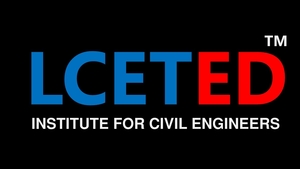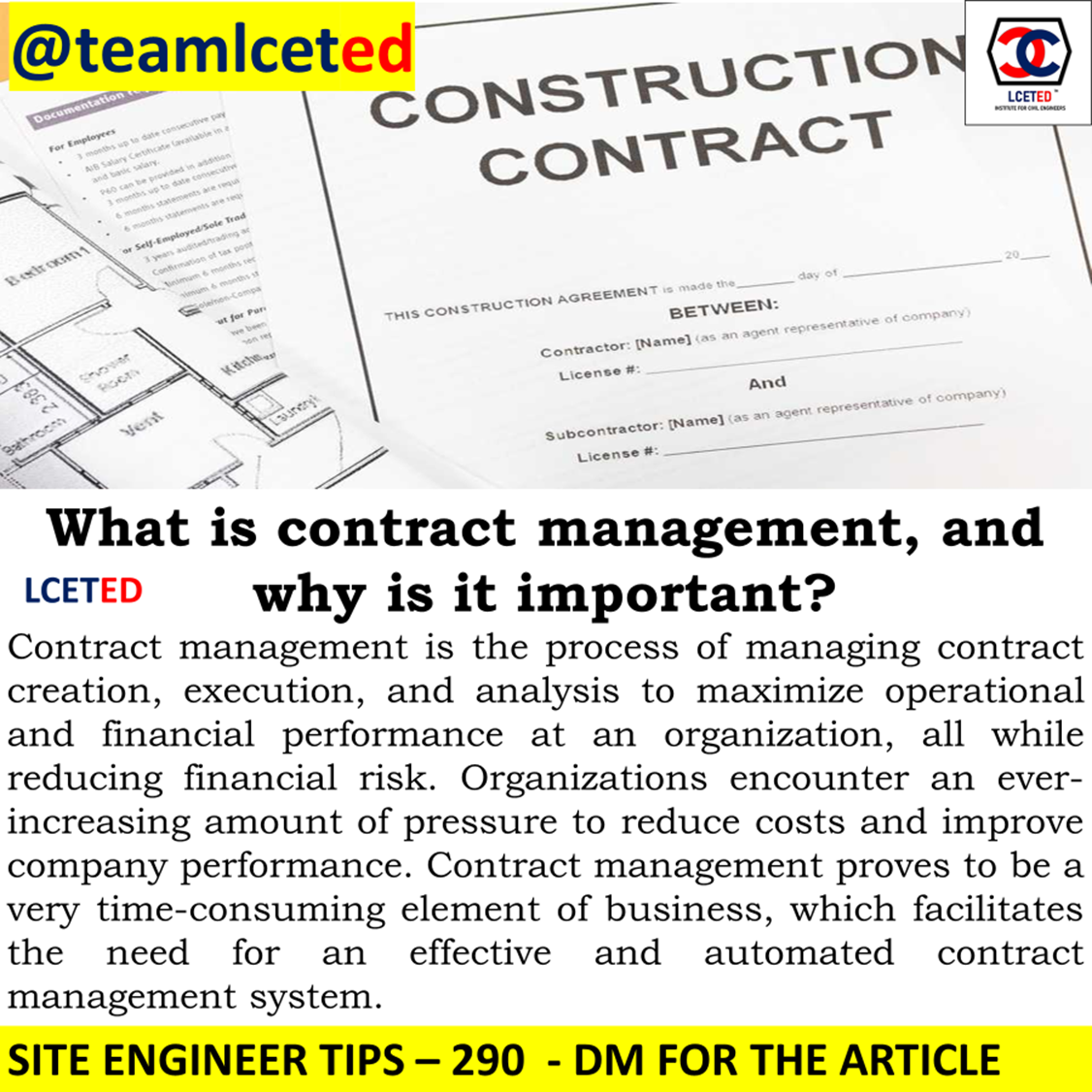What
is the Construction Contract?
According to the classic legal definition, a contract is a promise or several promises under which the law recognizes a duty to perform and for a breach of which the law provides a remedy.
The Contract must be free from
1. Misrepresentation
2. Mistake
3. Duress
4. Undue influence.
To fully understand that definition, we
need to look at the six elements of a contract.
i) Offer and acceptance.
ii) Consideration.
iii) Legal Capacity.
iv) Legal Purpose.
v) Genuine consent of parties.
vi) Agreement
Typical
Parties for Works Contract
1. Owners
a. Public Owner (Government bodies)
b. Private Owner (also include quasi-public bodies)
2. Architect/Engineers (A/E)
3. Prime/General Contractor
4. Sub-contractors
5. Suppliers
6. Banks & Financial Institutions
7. Specialized Service Agencies
8. Labor
9. Regulatory agencies
10. General Public
Types
of Contracts
1. Item Rate Contract
2. Cost Plus (Reimbursable Contract)
3. Lump Sum Contract
4. Design & Build a Contract
5. EPC (Engineering Procurement Construction)
Contract
6. Two-Stage Tendering Contract
Also Read: Types Of Payments Contract Used In Construction Industries
Other Contract Types (In Govt. Infra
Projects)
1. BOT (Build Operate & Transfer)
2. BOLT (Build Operate Lease & Transfer)
3. BOOT (Build Operate Own & Transfer)
Public Sector Projects
1. CPWD
2. PWD
3. BESPOKE (Separate State Level Contracts)
Private Sector Projects
1.
FIDIC - stands for Fédération Internationale des Ingénieurs – Conseils, which
means International Federation of Consulting Engineers. It is an international
standard organization for consulting engineering and construction best
known for the FIDIC family of contract templates.
2. Typical developer/owner contracts (again bespoke)
DOCUMENT
FORMING PART OF THE BUILDING
1. Invitation to the Tender (NIT)
2. Form of Tender (offer letter including all
revisions)
3. Annexure to Form of Tender (APPENDIX TO TENDER)
4. General Conditions (GCC)
5. Special / Particular Conditions (SCC / PCC)
6. Bill of Quantities (BOQ)
7. Technical Specification
8. List of Tender Drawings
9. Tender Correspondence / Amendment to NIT / Corrigendum
/ Addendums
10. Minutes of the pretender meeting
11. Tender Clarifications / Qualifications
12. Letter of Intent (LOI)
13. Letter of Award (LOA)
Salient
Conditions of Any Typical Contract
Top 15 Conditions That We Should Look for
In Any Contract (Apart from Safety & Quality Conditions)
COMMERCIAL CONDITIONS
1. Payment Terms
2. Performance Guarantee
3. Mobilization / Material Advance
4. Retention Condition
5. Escalation / Price Adjustment / Basic Rates
TIME-RELATED CONDITIONS
1. Contract Duration
2. Master Construction Schedule / Program
3. Delays and Notifications
4. Extension of Time Clause
5. Force Majeure
DISPUTE RELATED CONDITIONS
1. Claims Compensation Clause
2. Liquidated Damages Clause
3. Suspension of Works
4. Termination of Contract by Either Party
5. Dispute Resolution / Arbitration Clause
TYPES
OF DELAY EVENTS
EMPLOYER DELAYS
1. Delay in obtaining relevant statutory approvals
2. Delay in payments
3. Delay in approval of samples, materials, mockups,
design mixes, etc.
4. Discrepancies in contract/tender documents
CONTRACTORS DELAYS
1. Non-availability of the right number of resources –
Plant, Equipment, Labor, and Formwork.
2. Non-availability of the right project staff or
Frequent changes in project teams
3. Not maintaining the right cash flow at every
stage of the project
4. Not monitoring the vendors/subcontractors with
acumen skillset
5. Not maintaining the procurement strategy as
planned
6. Not adhering to H&S and QA / QC protocols
NEUTRAL DELAYS (FORCE MAJEURE EVENTS)
1. Excessive rainfall / Cyclone/drought / Climatic
changes / Epidemic / Pandemic
2. Any political changes including Elections
3. Law and order issues in the locality/town
RECORD
KEEPING AND COMMUNICATION
A record can be in the form of
1. Emails
2. In & Outgoing Letters
3. Minutes of the Meeting
4. Daily reports (DPR)
5. Weekly reports (WPR)
6. Monthly reports (MCR)
7. Site instructions
8. Drawing registers
9. Pour cards
10. Inspection checklist
11. Submission of documents
to authorities
12. Health & Safety documents
13. QA / QC & QMP documents
1. Request for information (RFI)
2. Variations / Change order instructions (VO / CO)
3. Material / Sample approval transmittals
4. Design approval transmittals
5. Labor induction records
6. Hindrance registry
7. Shop drawings – submission/approval
8. As-Built drawings
9. MCP submission, tracking & revisions
10. Confirmation of verbal instructions (CVI)
11. Early Warning Notices (EWN)
12. Monthly interim
RA bills – Submitted & certified
13. Payment receipt records
14. Photographs
15. Videos/text messages
16. Muster rolls/Attendance records
IMPORTANCE
OF CONTRACTS
Why Contracts Management is Essential for
Projects?
• It is mandatory that every member of the site team be fully aware of the key contractual obligations with the Employer, to
ensure:
• Timely identification of risks and steps to
mitigate them,
• Proactive thinking and notification to Employer,
• Understanding the repercussions of
non-identification/ non-notification / non-remedying of risks or delays
• Understanding the repercussions of non-adherence /
non-conformities to contractually agreed
terms and specifications
• Understanding the scope for claims (Extra items/
Variations/ Idle Claims, etc.)









No comments:
Post a Comment